Robbe's Little Garden and the Metropolia University of Applied Sciences in Myrrmäki entered a joint research, testing year-round strawberry cultivation in a closed environment. The so-called Urbanfarmlab is developing solutions that are set to be adopted at an industrial scale.
"We want to look at the possibilities of growing strawberries year-round. Foreseeing that there will be a future demand for 12 months per year as Finnish customers are demanding local production of fresh fruit, as well as vegetables," says Robbe Jordas, Founder of Robbe's Little Garden, a Finnish farming company adopting vertical farming and greenhouse farming techniques to cultivate year-round.
"The market prices are good in Finland tunnel-berries are 8-12 euros per kg. Even summer berries usually do not go under 5 € / kg. Adopting vertical farming is not viable in the summer. However, for mid-winter production with no natural sun available, there could be a market opportunity," Robbe adds.
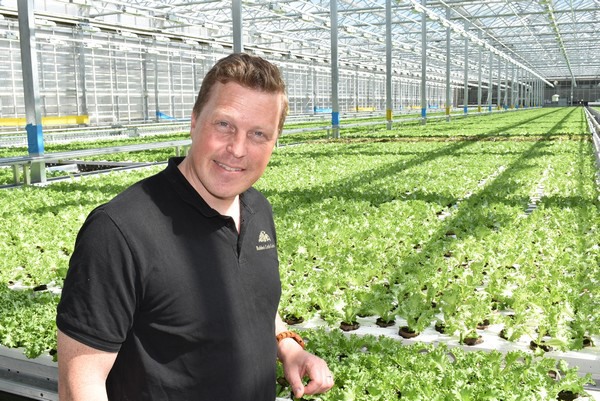
The R&D project
Metropolia's collaboration platform Urbanfarmlab's new growing rooms are closed, and their conditions, such as humidity, temperature, lighting, nutrients, and carbon dioxide, can be fully controlled and monitored. The two new spaces are larger than the ones put into use a year earlier. The facilities are the only ones of their kind in Finland for the research, development, and innovation use of an educational institution.
"This test focuses on testing light levels and has a poof of yield for the variety. On top of this we will also test other changes in the climate but this we cannot speak openly about," Robbe affirms.
In the Food System City project, strawberry seedlings grow in the rooms, which are grown in cooperation with the horticultural company Robbe´s Little Garden. The breeding conditions are monitored and controlled via a computer and with the help of cameras installed in the facilities. Metropolia's automation know-how is also utilized. The seedlings were planted in April, and the harvest is expected in just over half a year.
Thanks to the automated systems developed for the rooms, and AI applications, they can be used in education at Metropolia in the future. "Urbanfarmlab now has even more versatile experimental environments. Previously, the research room could only be cooled to 16 degrees, but now with the new technology installed, the lowest temperature can be as low as 10 degrees. This makes it possible to cultivate more challenging varieties, such as strawberries," Metropolia's project specialist Andrea Patané says.
Robbe has provided LEDs for the project and will be providing the link to the commercial horticulture business. The team will be helping out with the growing setup, the profitability of the project, investment cost, energy use, and labor cost which are the most critical parameters in commercial set-ups. "Eventually, the setup can also be adopted for a pre-growing system for tunnel strawberries."
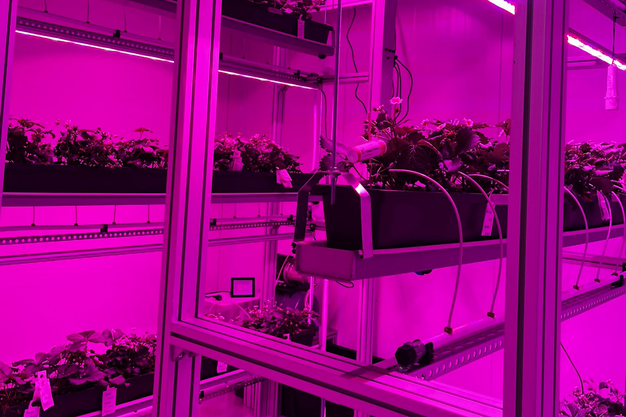
The setup at the Metropolia University
Urge for new technological innovations
"The energy crisis, the rising cost of fertilizers, and high inflation affect food production. Indoor farming can improve the sustainability of food production, and also the accessibility of food. In a closed growing environment, it is possible to enhance and control the use of water, nutrients, and land, and to obtain higher yields, even improve some challenges in indoor farming is still energy intensity, so fossil-free energy solutions, renewable energy, solar and wind power, and solutions for utilizing industrial waste heat in food production are needed," says Merja Rehn, Metropolia's director of innovation.
The research space has two floors, the machine rooms are on the upper floor to make sure the actual research environments remain free of extra equipment. This allows both cultivars to maintain similar growing conditions. Ultimately, the right growing envelope will be used to scale the techniques to an industrial scale.
"One of the most important drivers of indoor cultivation is that it is possible to cultivate all year round anywhere, in cities and urban areas, for example on the roofs of apartment buildings. Optimizing the process is also important to provide companies with researched information related to energy consumption, nutrients, and water-saving optimization," says project designer Patané.
When the strawberries are ripe, they will undergo statistical and chemical analyses in the lab, checking crop quality, profitability calculation and measuring the scalability. In the laboratory, the products will experience sensory taste tests and nutritional value studies, such as measuring vitamin C and antioxidant concentrations. Part of the harvest is taken to Vantaa Vocational College Varia as raw materials for baker-pastry students.
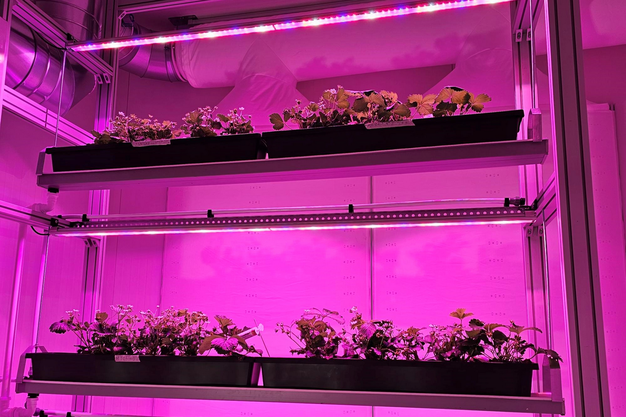
Urbanfarmlab is one of the collaboration platforms of Metropolia's Clean and Sustainable Solutions Innovation Center, which researches food production and new food technology, as well as the operational possibilities of the food ecosystem in an urban city environment. Investment in new food technologies is growing worldwide.
Metropolia's Myyrmäki campus trains, among others, laboratory analysts as well as environmental technology, bio- and food technology, electrical and automation technology, electronics, and mechanical engineering engineers. In Urbanfarmlab, students are involved in developing, for example, irrigation systems, researching LED lighting, or analyzing the nutritional content of products in the laboratory in various projects, such as innovation projects included in the studies, theses, internships, or other course projects.
In addition to Robbe's Little Garden strawberries, wasabi, and edible flowers are currently growing on campus. Both projects are done in cooperation with food product developer Arctic Farming. In addition, Urbanfarmlab cooperates with the deli company Ituitu.
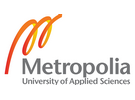 For more information:
For more information:
Metropolia University of Applied Sciences
Andrea Patané, Project designer
andrea.patane@metropolia.fi
Merja Rehn, Director of Innovation,
merja.rehn@metropolia.fi
www.metropolia.fi
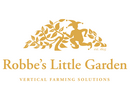
Robbe's Little Garden
Robert Jordas, Owner
robert.jordas@robbes.fi
www.robbeslittlegarden.com
